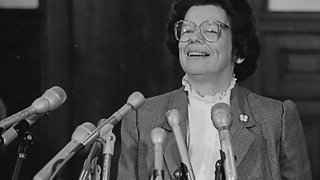
The first woman to ever serve as chief justice of the Connecticut Supreme Court has died. She was 94.
Ellen Ash Peters was the first woman appointed to the state Supreme Court in 1978 and six years later, she became the first woman to serve as chief justice.
“Chief Justice Peters achieved many firsts...She is a trailblazer, who in her nearly two decades of public service authored hundreds of opinions, many of which continue to have a lasting impact," Gov. Ned Lamont said in a statement.
The governor noted Peters' opinion in the landmark Sheff V. O’Neill decision, which extended civil rights to Connecticut schools, holding that the state has an obligation to provide school children with equal educational opportunities.
Get top local stories in Connecticut delivered to you every morning. >Sign up for NBC Connecticut's News Headlines newsletter.
Peters was born in Berlin, Germany in 1930. She emigrated to the U.S. with her parents and studied at Yale Law School. She graduated in 1954.
After that, Peters was a law professor at Yale until her appointment to the Supreme Court. She has received several awards including the first Ella T. Grasso Distinguished Service Medal, the Yale Law School Distinguished Service Medal and more.
"Throughout her tenure, she dedicated her work to ensuring that Connecticut’s courts are operated fairly and are equally accessible to all of this state’s residents. Her service is to be emulated and she will be remembered for her intelligence, her tenacity, and her remarkable fortitude," Lamont said.
Local
She was written hundreds of books and articles on various aspects of the law of contracts, especially on commercial law.
"Her time on the court was guided by a belief in equal access for all, and an unwavering commitment to eradicating gender and racial bias across our state’s judicial system. Her legacy will live on in the hundreds of law students and clerks she mentored over her distinguished career," Lt. Gov. Susan Bysiewicz said in a statement.
Current Chief Justice Richard Robinson said he is saddened to learn of Peters' death, but is "incredibly honored" to have been able to work beside her.
"While small in stature, she was a fearless legal giant who was dedicated to upholding the rule of law. She also recognized the importance of fairness, openness, transparency and providing true equal access to justice for all," Robinson said in a statement.
The cause and location of her death were not immediately disclosed.
Peters fully retired in February 2017.



